
CFM vs. PSI: What You Need to Know to Size an Air Compressor
November 13, 2024
The Top 20 Benefits of Rotary Screw Compressors for Industrial Use
November 27, 2024How to Choose an Air Compressor for Your Business
Kaishan USA | November 20, 2024| Uncategorized
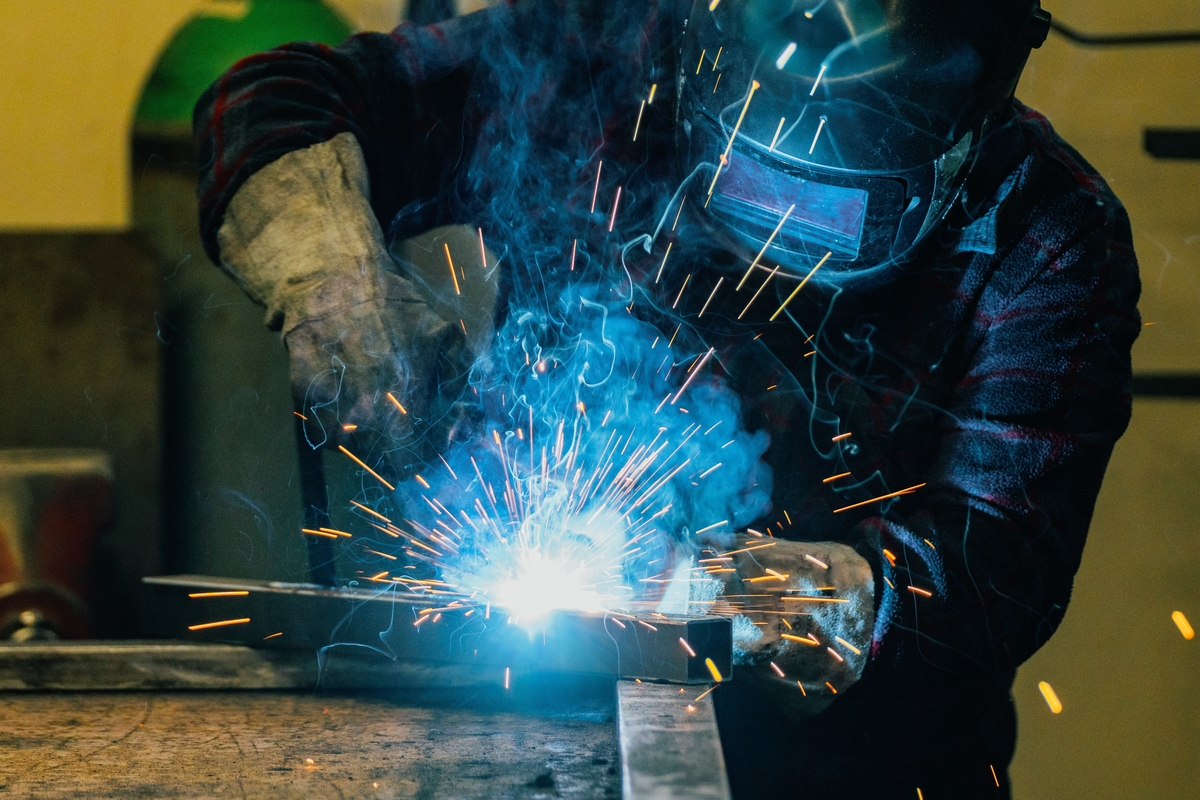
By adding gases and particles to the air, a metallurgical process such as welding can significantly impact the operation of a commercial air compressor. So, you’ll want to clearly establish where, how and when a new compressor will be used.
If you’re in the market for a new commercial air compressor, we encourage you to ask yourself some basic questions about your facility and your needs.
The best way to decide how to choose an air compressor is to start out thinking like a traditional journalist, asking yourself the five w‘s: who, what, when, where, why (and how).
Let’s start with who.
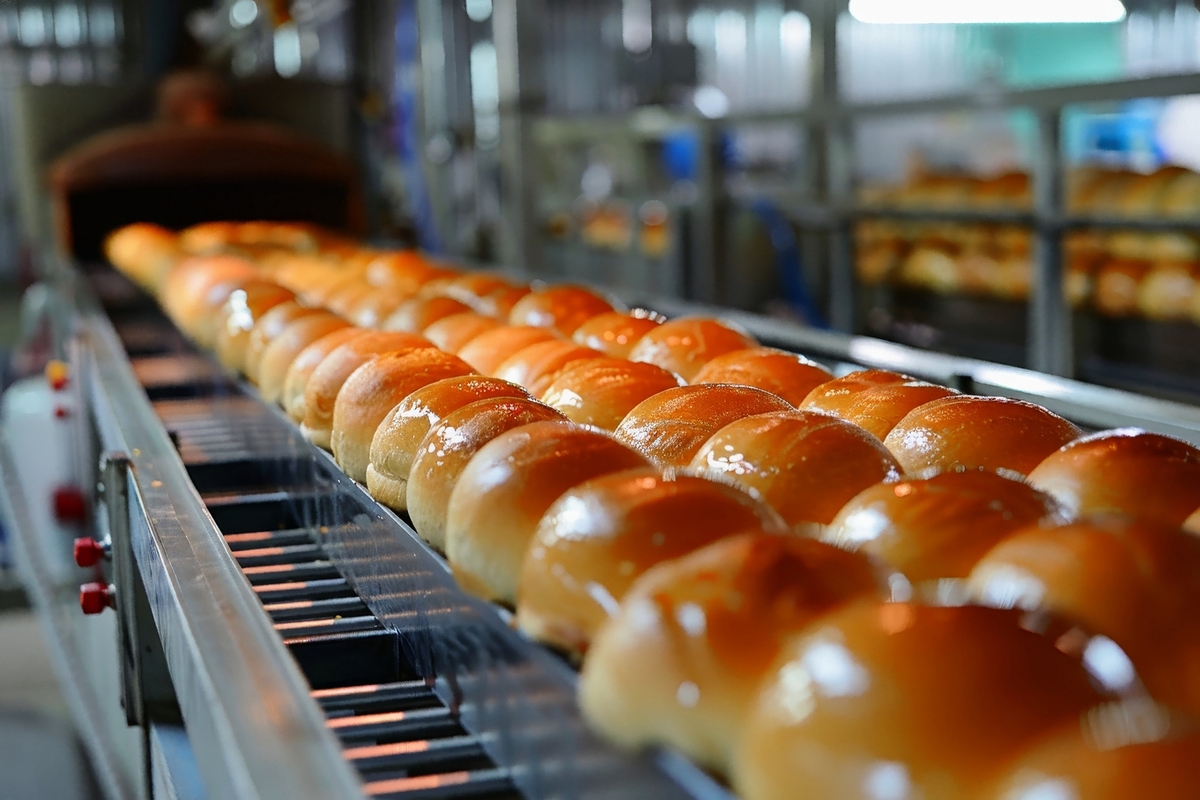
Air that comes in direct contact with food and beverage products should come from an oil-free unit, such as Kaishan’s KROF two-stage oil-free rotary screw air compressor.
Who Are You?
What industry are you in? Does your process present any particular challenges?
In the food and beverage industry, for example, compressed air must meet stringent food safety requirements. Similar air quality standards are in place for the medical and healthcare industries.
Different types of purity requirements apply in the semiconductor and electronics industries. Even painting a car to give it a mirror finish makes automotive applications challenging.
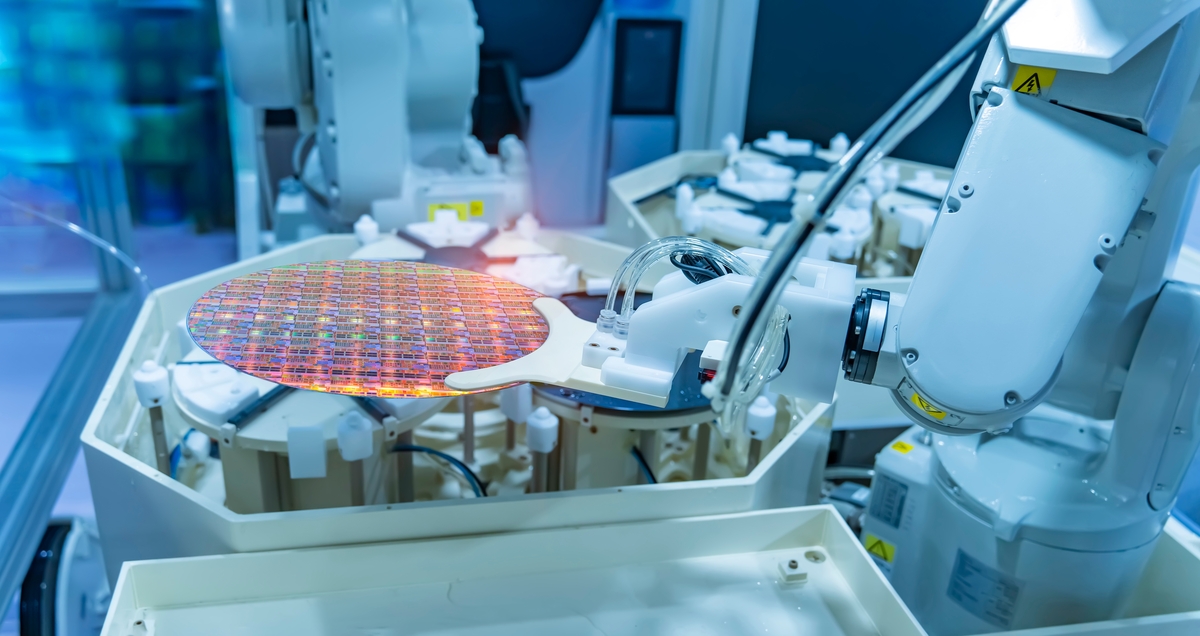
Robotic equipment serving the semiconductor industry semiconductor needs to have a very high level of purity.
Applications That Need High Flow (CFM)
And industries like mining, oil and gas and metallurgy present challenges to commercial air compressors because of the dust and dirt in the air.
All those factors help answer the next question—what.
What Do You Need?
There are three main types of compressors in use today in industrial applications: reciprocating, centrifugal and rotary screw air compressors. Each has its unique advantages:
Reciprocating compressors are the least expensive option. They use pistons to compress air, much like an automobile engine. Unfortunately, they can only run 50% of the time (or 30 minutes per hour) to give them time to cool down. To compensate for that limited duty cycle, you will need a recip with a larger horsepower rating than you would need for the other compressor types. Many owners also complain that they are noisy, including our customers Factory Finish Smart Repair, Hubbard Feeds, Strategic Materials and Custom Thermoelectric.
You can get larger industrial-grade reciprocating compressors that operate at a 100% duty cycle. But they are very expensive. New, smaller screw technologies are emerging that will overcome the limited duty cycle of recips, bringing screw compression to traditional reciprocating users.
Centrifugal compressors are highly efficient at higher volumes with steady demand. An impeller sucks air in, then that energy is turned into pressure when the air hits a diffuser plate. They can produce a lot of air from a small footprint but are only cost-effective at higher volumes.
Rotary screw compressors are the best choice for most industrial applications, delivering more compressed air per horsepower. They work best at a 100% duty cycle, as close as possible to a full load. They are known for their dependability, long life and low cost of ownership.
For more on the pros and cons of different compressor types, read our blog post, “Which Type of Air Compressor Is Best for Your Application?”.
What Size?
To decide how big a compressor you’ll need, you must first determine how much pressure (measured in pounds per square inch gauge or PSIG) and how much flow you’ll need (measured in cubic feet per minute, or CFM). You’ll base the PSIG on the highest pressure of the tools you’re supplying with air, while the flow is calculated by adding up the CFM requirements of your individual end-use applications.
Sizing is probably the most critical decision you’ll make, perhaps even more crucial than the type of compressor or even the brand. Why? Because the most serious compressor problems almost always start with mistakes in sizing or application.
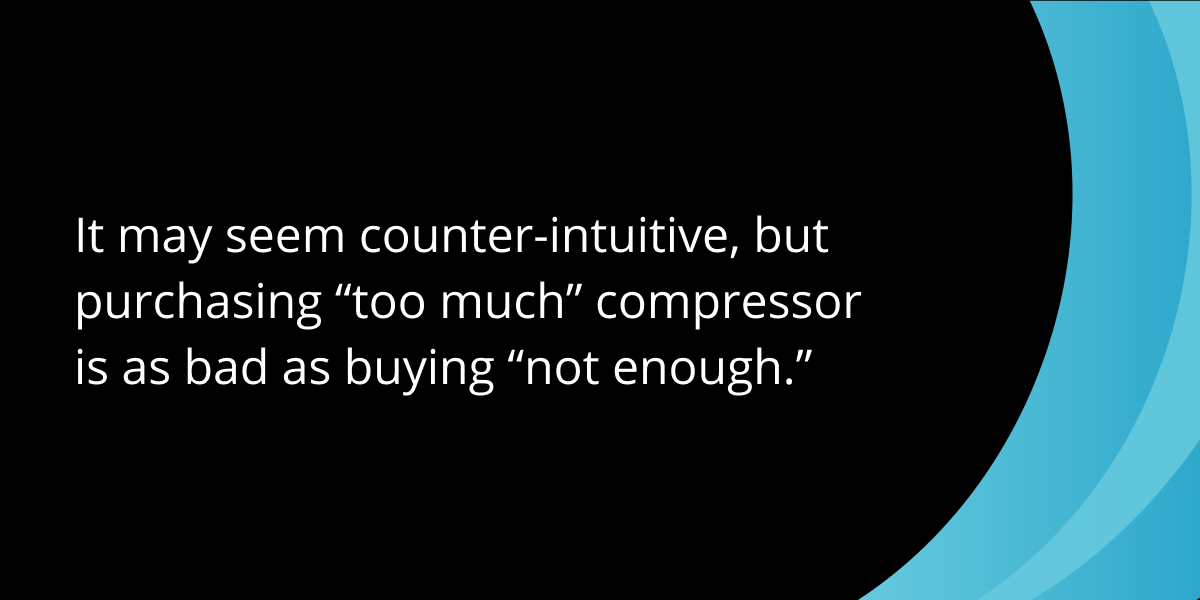
We encourage our customers to avoid the natural tendency to oversize. It may seem counter-intuitive, but purchasing “too much” compressor is as bad as buying “not enough.”
That includes buying a compressor with “room to grow” or planning for future expansion. The reason is that rotary screw air compressors are designed to run on a 100% duty cycle. If they run less than that, you’ll probably waste electricity.
Even worse, your new compressor could begin starting and stopping too often. That leads to rapid cycling, which requires frequent maintenance and can lead to oil carryover and overheating. Long term, it increases wear and tear on critical internal parts and shortens a compressor’s lifespan. We’ve seen situations where new compressors fail after just six months of excessive rapid cycling.
For more on sizing your compressor, read our post, “Everything You Need To Know About Sizing Industrial Air Compressors for Manufacturing.” Or download our white paper, “Demystifying Air Compressor Sizing.” Your local distributor is also a great resource.
Sizing may also be affected by the timing of your compressor use.
When Do You Need It?
When adding up your flow from your different end applications, you’ll need to consider how often individual tools are used. Most, in fact, don’t run continuously. More like intermittently.
To avoid oversizing and the problems that result, you’ll want to weigh how often the tools are used and take that into consideration when you’re estimating how much flow you’ll need. For example, if you have ten tools, each using 5 CFM of air, that might indicate that you need 50 CFM of flow constantly. But if they’re only being used half the time, 25 CFM might be enough.
For more information on calculating your requirements for pressure (PSIG) and flow (CFM), read our blog post, “How Many CFM Do I Need? Air Pressure by Different Applications.”
In addition, most facilities do not use a consistent amount of air 24/7. Usage changes over the weekends and as shifts change. We often recommend that companies meet these changing conditions with a multiple compressor set-up, including a main, trim and backup compressor, which also enhances energy efficiency and almost eliminates downtime. For more on a multiple-compressor configuration, read our blog post, “How Energy-Efficient Air Compressors Can Reduce Your Carbon Footprint.”
You may think that a compressor with a variable-speed drive would address many of these issues. And in many cases, they do. But VSDs are not for everyone. For more on the pros and cons of VSDs, see our blog post, “How Variable-Speed Drive Rotary Screw Air Compressors Save You Money.”

An air audit by a compressed air professional can save you a lot of headaches and more than pay for itself in improved compressor performance and lifespan.
If your demand for compressed air fluctuates significantly throughout the week, you will benefit from an air audit. We have captured several success stories about companies that achieved remarkable savings in our white paper, “How an Air Compressor Audit Can Help You Build Competitive Advantage.”
Another crucial consideration in compressor selection is choosing an appropriate location.
Where Will You Put It?
You can place a compressor indoors or outside, depending on the climate in your area. However, outside locations should be sheltered from the elements and direct sunlight in the mornings or late afternoons.
Because air compressors need a consistent source of air, you’ll want to ensure sufficient ventilation, usually air vents (at a minimum) for smaller units and forced air for larger ones. For more on making sure your compressor has adequate ventilation and cooling, read our blog post, “All the Ways Heat Gets into Your Compressed Air System (And How To Get It Out).”
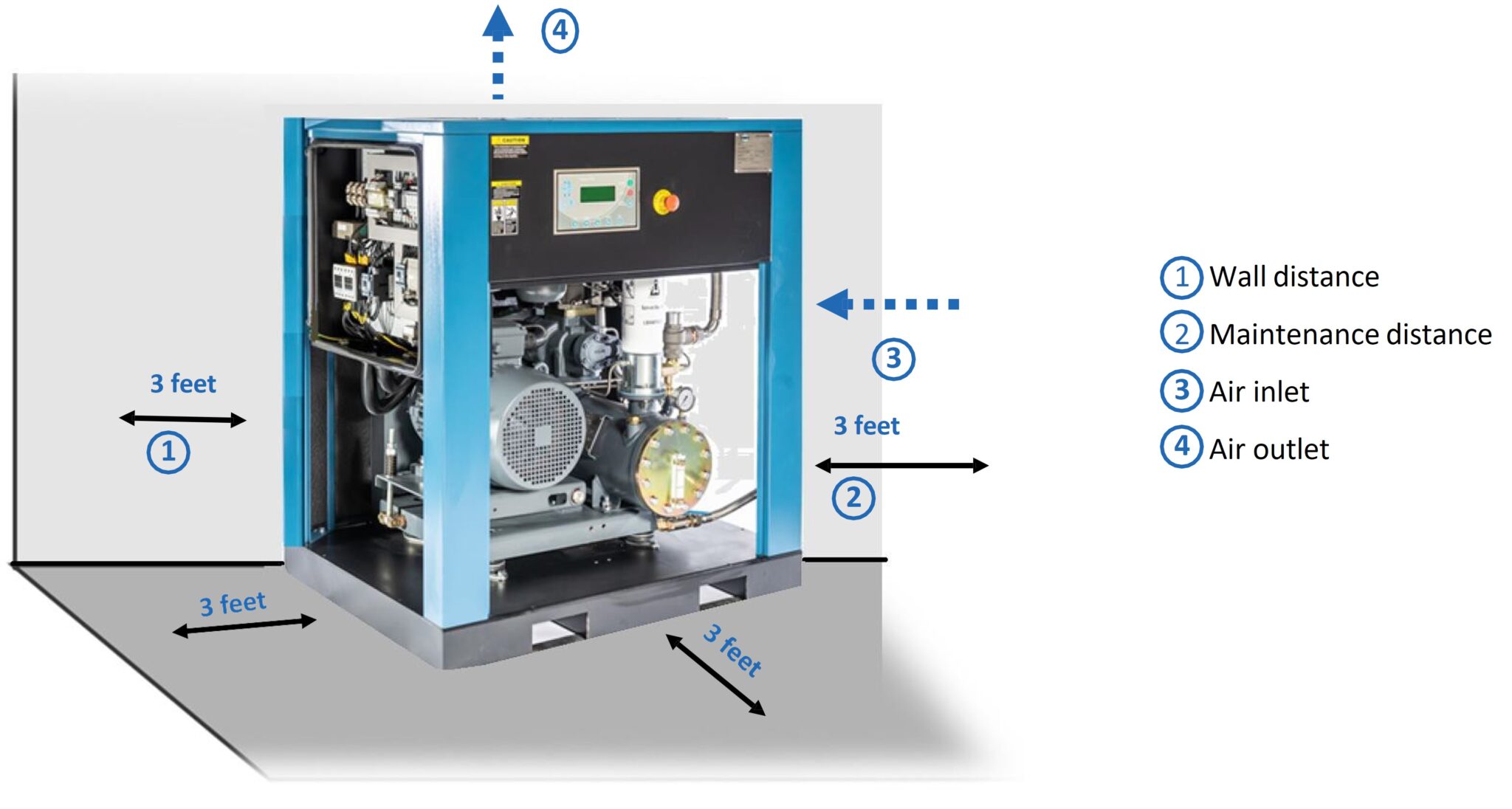
You should allow adequate spacing around a compressor for ventilation and maintenance access.
In the compressor room itself, you allow enough space around the unit for air circulation and for maintenance, of course. You’ll also want to make sure the room does not have other heat-producing equipment like a boiler. For more on laying out a compressor room, read our blog post, “Compressor Room Design.”
Why Do You Need It?
If your current compressor is failing, it’s essential to know why. If you don’t know for sure, you may be wasting your money by buying a new one that quickly experiences the problems that caused your old unit to fail.
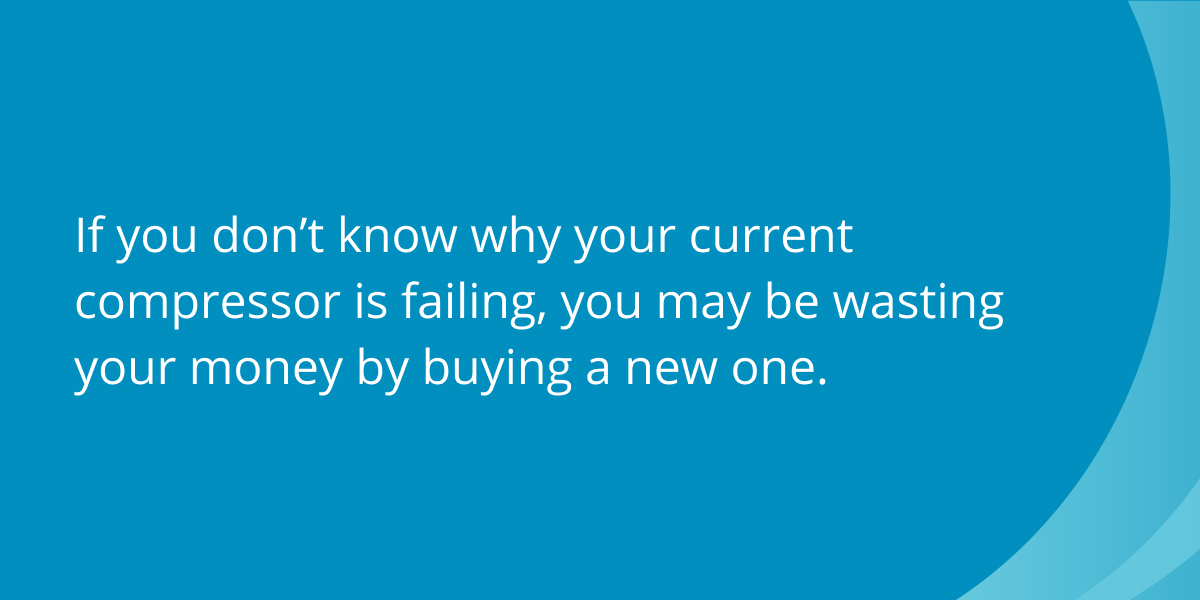
You may even be weighing the decision about whether a repair or replacement is appropriate. We walk you through that decision process in our blog post, “Signs Your Air Compressor Needs Repair or Replacement.”
How Are You Going About It?
There is a lot riding on your choice of the right compressor. Selecting wisely can ensure reliability, energy efficiency, cost effectiveness and a steady supply of high-quality compressed air for years if not decades.
That’s why we always recommend that you work with a trusted professional who can guide you through many of these decisions and give you the expert advice you need.
We are fortunate to work with a nationwide network of independent distributors, who can be a local resource to help you optimize your compressed air system. Providing on-site analysis and consultation that will help you make wise purchase decisions. And serving as a valued partner in the ongoing operation and maintenance of your system.
Key Takeaways
Successfully choosing the right commercial air compressor for your business requires that you ask yourself some critical questions aligned with the five w's of journalism:
- “Who are you?” urges you to determine any particular challenges your industry presents.
- “What do you need?” identifies which of the different types of compressors will work best in your application.
- “When do you need it?” presses you to determine the variation in your compressed air usage.
- “Where will you put it?” helps you ensure your compressor is going into a setting where it will be successful.
- “Why do you need it?” encourages you to explore the reasons your current compressor is failing.
- “How are you going about it?” stresses the benefits of getting the assistance of a professional consultant in choosing a commercial air compressor.
Let Us Help
Choosing a commercial air compressor for your business is a critical decision that could impact the energy efficiency, reliability and cost effectiveness of your compressed air system and all the processes that rely on that system. If you need help making a selection, get in touch with the experts at Kaishan. Contact us today.
Random stat or
customer quote
textXXtext
text

